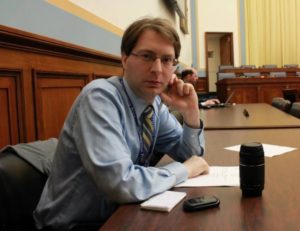The Problem With Trying to Be on the ‘Right Side of History’
In 2015, I graduated from George Mason University with a master’s in history. As part of my studies, I had access to large volumes of peer-reviewed published journal articles by historians, going back several decades. One day, before I graduated, I decided for fun to search the term “right side of history” to see how often professional historians actually used that term. The search engine, which combed through countless articles published over generations, found exactly one published article in a historical journal that used it. That was how valid mainstream historical academia viewed the popular term.
In my forthcoming novel Memories of Lasting Shadows, I examine a possible future United States of America. The setting is a speculative one in which forty years have gone by since the United States Supreme Court abolished abortion. Two generations have been born and raised with the presumption that abortion is not only illegal, but unthinkable.
Granted, such an absolute change to our laws on abortion in real life is very unlikely. Then again, in the early twentieth century, few Americans believed there would ever come a time when the Supreme Court would unanimously strike down institutional segregation. For many decades, pro-segregationists believed they were on the “right side of history.”
Point is, we have no idea how history will be written, because historians, like the rest of us, are influenced by their time and place. Events that we cannot predict, factors that we will never experience, and so much more will come long after we are dead.
As a result, many past figures have bounced between the “right side” and the “wrong side” of history, often switching sides long after they have died. Christopher Columbus is a great example, having moved between the two categories on multiple occasions since the early sixteenth century. For their efforts to change the South, the Radical Republicans of the Reconstruction Era were considered villains for many decades. By the 1960s, however, the same Radical Republicans found themselves the heroes; if anything, their racially progressive views made them well ahead of their time.
There are many reasons to support a cause. Fretting about getting on the good graces of the next generation or two should not be one of them. After all, there is always the great if not inevitable likelihood that those future generations will themselves be judged wrong by generations after that.
It is my hope and prayer that Memories of Lasting Shadows will change society. Among other things, I hope it causes people to reconsider the idea of “right side of history” and “wrong side of history” by toying with their view of just who will win and who will lose. Because one thing human history has in great supply are people who knew their cause would ultimately win out in the end.
 Memories of Lasting Shadows – Coming October 27 — Pre-Order Now!
Memories of Lasting Shadows – Coming October 27 — Pre-Order Now!
It has been forty years since the United States of America abolished abortion. The long debate, which brought so much division and discord, was finally brought to an end, and two generations of citizens have reached maturity in this new normal.
United States Senator Benjamin Pettus was alive when choice was the law of the land. A doctor by profession, over the past several years, he has struggled to preserve a sweeping federal healthcare law he helped create.
Roberta Sheridan was born and raised in a world where terminating an unborn child is both illegal and unthinkable. A devout Christian and principled journalist, Roberta is about to discover that the past is never truly gone.
A political thriller, the story navigates the D.C. area’s partisanship, oratories, protests, and Beltway maneuvering which come together to forge a vast industry of ideological conflict.
 Michael Gryboski was born and raised in the Washington, DC, metropolitan area. He graduated from George Mason University with a bachelor of arts and then a master’s, both in history. In addition to writing fiction, Michael also writes news articles for a living. Michael would rather be correct than widely accepted.
Michael Gryboski was born and raised in the Washington, DC, metropolitan area. He graduated from George Mason University with a bachelor of arts and then a master’s, both in history. In addition to writing fiction, Michael also writes news articles for a living. Michael would rather be correct than widely accepted.
